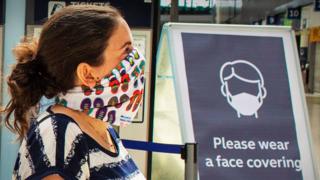 Image copyright
Alamy
Image copyright
Alamy
The UK government has been urged to clarify its position on face coverings, after PM Boris Johnson said a "stricter" approach was needed in England.
So who should be wearing a face covering and how do the rules compare in different countries?
How many people wear face coverings?
There is a lot of variation around the world when it comes to wearing face coverings in public, according to polling company YouGov.
People in Asian countries are most likely to say they wear them. In Singapore, where it is an offence not to wear a mask outside your home, 90% of people do so - the highest rate in the world.
In Europe, the proportion of people wearing masks is highest in Spain (86%), followed by Italy (83%) and France (78%).
In the UK, just 36% of people say they wear a mask in public - although this has been steadily increasing.
In the US, the rate is 73%, which is slightly higher than its neighbour Canada (60%).
The data comes from surveys run in nearly 30 countries.
Do face coverings work?
World Health Organization (WHO) advice says non-medical face coverings should be worn in public where social distancing is not possible.
Coronavirus is spread when droplets are sprayed into the air when infected people talk, cough or sneeze. Those droplets can then fall on surfaces.
The WHO says there is also emerging evidence of airborne transmission of the virus, with tiny particles hanging in aerosol form in the air.
Homemade cloth face coverings can help reduce the spread from people who are contagious but have no symptoms or are yet to develop symptoms. This is called asymptomatic or presymptomatic transmission.
Scientists in Singapore suggest the contagion risk is especially high in the 24-48 hours before an infected person is even aware they might have the disease.
Taking a face covering on and off can also risk contamination, the WHO says.
What are the face covering rules in England?
Anyone travelling by bus, train, ferry or plane in England should wear a face covering.
Some passengers are exempt from the rules including:
- Children under 11
- People with disabilities
- Those with breathing difficulties
- Anyone travelling with someone who relies on lip reading
If it is "reasonably necessary" for you to eat or drink, you can remove the face covering to do so.
People can be refused travel if they don't follow the rules, and can be fined as a last resort.
Public transport excludes cruise ships, school transport, taxis and private hire vehicles. However, ride-sharing company Uber has made face coverings compulsory.
The prime minister has suggested the face covering rule could be extended to shops as well. However cabinet member Michael Gove said he thought they should not be compulsory.
What about the rest of the UK?
In Scotland, it is also compulsory to wear face coverings on all public transport. Face coverings are also mandatory in Scotland's shops.
Young children, people with certain health conditions and drivers behind a protective shield are exempt.
People in Wales are being asked to wear non-medical face coverings where social distancing is not possible. The government is making their use mandatory on public transport from 27 July.
The wearing of face coverings on most buses, trains and ferries became mandatory in Northern Ireland on 10 July.
Where am I supposed to get a face covering?
The government has been careful to use the term "face covering" rather than "face mask" - with surgical masks kept for medical use.
The BBC has created a guide on how to make your own face covering. The government has issued its own advice too.
What are the face covering rules in hospitals?
All hospital visitors and outpatients in England are being told to wear non-medical face coverings - although no-one will be denied care, and coverings will be provided by hospitals if necessary.
Health staff have to wear surgical masks at all times, in all areas.
The most protective mask for health staff is an FFP3 or, alternatively, an N95 or an FFP2.